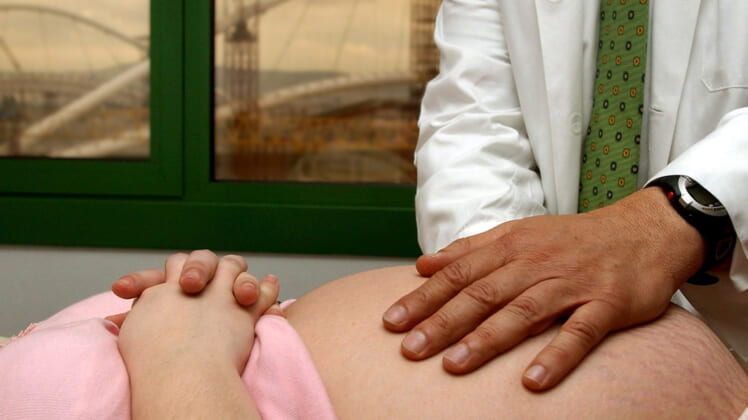Pregnancy Stages – Weeks 5 and 6

During the 5th and 6th weeks, a lot is going on for that tiny package developing inside your body. During this early period of life, the embryo is going through an extraordinary explosion of growth and development — changes that are among the most dramatic in the course of a human life.
During this two-week period, the embryo will grow from about the size of a lowercase “o” to the size of a grain of rice — from less than one tenth of an inch to about 4 millimeters. It is now curled into a “C” shape, and has a tail that will become the coccyx at the base of the spinal column. The heart and the digestive system are beginning to form. The arms are developing to develop in the form of tiny buds, and leg buds are beginning to show. The ear canals are starting to take shape, as well as the vague beginning of the lenses of the eyes.
The embryo’s primitive heart begins to beat on the 22nd day after conception. If you were to have a transvaginal ultrasound at this point in pregnancy, you might be able to see your baby’s tiny heart beating. The neural tube, which will form the spinal cord, nervous system and the brain, is closing at the top. The embryo’s little brain is developing as well.
For these reasons, it is crucial to stop drinking alcohol as soon as you know you’re pregnant (and even if you are planning to get pregnant) — alcohol is a nerve poison and can permanently injure your baby’s developing brain.
In the rare instances when the baby’s neural tube doesn’t close successfully, a birth defect known as spinal bifida can result. Folic acid reduces the risk of spina bifida. If you are pregnant — or trying to become pregnant — you should talk to your practitioner about prenatal vitamins containing folic acid. If you could see your baby now, she would look like a tiny underwater creature: a shrimp, or some type of aquatic larvae. But if you looked closely, you would probably be able to detect the shape of a head, with the first traces of eyes and the beginnings of nostrils. A jaw is developing. The face is just beginning to take form.
As the embryo develops, its cells are releasing increasing amounts of the hormone human chorionic gonadotrophin (hCG) into your bloodstream, which means that you are more likely to get a positive pregnancy test. During this time, you may also be feeling more nauseated.
For most women, morning sickness worsens during the first trimester. Be sure to talk to your physician if your morning sickness is extreme. In some cases, intervention is necessary for the health of the mother and unborn child. Discuss even minor symptoms, as your doctor or midwife will have advice for easing your discomfort.
Along with nausea, you may find that you have to urinate more frequently than usual. This is a symptom that some women experience during their first trimester of pregnancy. (However, mention it to your doctor because the need to urinate frequently may also indicate a urinary tract infection.)
You may also find that you urinate a little when you sneeze, cough or burst out laughing. Don’t worry, you aren’t losing control of your bladder, and the problem will not become serious. Your uterus is growing and putting pressure on your bladder, which sits in front of the uterus at this point in pregnancy. As your pregnancy progresses and your uterus expands, it will move away from your bladder, and you should get some relief.
Breast tenderness and overwhelming tiredness are other common symptoms of early pregnancy. The increase in the hormones estrogen and progesterone can also make your breasts feel swollen and sore.
This is a good time to pamper yourself. Make sure you get enough rest and eat nutritious meals. Try not to overdo it, and avoid alcohol and smoking. Don’t let yourself get overtired or overstressed. Take frequent naps if you can, or — if you’re so inclined — try meditation, prenatal yoga classes, and massage. Consider taking a vacation — or at least a weekend getaway — so you and your partner can have some special time together. (But if you go to the spa, stay out of the hot tub and sauna.) You’ll be better prepared to meet the joys and challenges ahead if you take good care of yourself now.
References
The First Trimester: A Time of Invisible What to Expect, Mayo Clinic, June 20, 2009. http://www.mayoclinic.com/
Fetal Development: 2 Months from Sutter Health, http://babies.sutterhealth.org/babygrowth/fetaldev/bg_fetaldev-2.html
Pregnancy Calendar, Week 5, from the American Academy of Family Physicians http://www.kidshealth.org/
Life Before Birth, by Marjorie England, Mosby-Wolfe Publishing.
The Miraculous World of Your Unborn Baby, by Nikki Bradford, Contemporary Books.
Becoming A Baby, by William F. Supple, Jr., Picket Fence Publishing.
Shanahan, M. Kelly, Your Over-35 Week-by-Week Pregnancy Guide, Prima Publishing, a division of Random House, New York.
Campbell, Stuart, Watch Me Grow, St. Martin’s Griffin Press, New York.
Curtis, Glade B, Schuler, Judith,Your Pregnancy Week by Week, De Capo Press, Cambridge, MA
Last Updated: March 11, 2015
Pregnancy Health Library Copyright ©2015 LimeHealth. All Rights Reserved.
